Related Research Articles

Rwanda, officially the Republic of Rwanda, is a landlocked country in the Great Rift Valley of East Africa, where the African Great Lakes region and Southeast Africa converge. Located a few degrees south of the Equator, Rwanda is bordered by Uganda, Tanzania, Burundi, and the Democratic Republic of the Congo. It is highly elevated, giving it the sobriquet "land of a thousand hills", with its geography dominated by mountains in the west and savanna to the southeast, with numerous lakes throughout the country. The climate is temperate to subtropical, with two rainy seasons and two dry seasons each year. It is the most densely populated mainland African country; among countries larger than 10,000 km2, it is the fifth-most densely populated country in the world. Its capital and largest city is Kigali.
The United Nations Development Programme (UNDP) is a United Nations agency tasked with helping countries eliminate poverty and achieve sustainable economic growth and human development. The UNDP emphasizes on developing local capacity towards long-term self-sufficiency and prosperity.

The least developed countries (LDCs) are developing countries listed by the United Nations that exhibit the lowest indicators of socioeconomic development. The concept of LDCs originated in the late 1960s and the first group of LDCs was listed by the UN in its resolution 2768 (XXVI) on 18 November 1971.

The Rwandan Patriotic Front is the ruling political party in Rwanda.
Kevin Eugene Deveaux is a Canadian lawyer and an international expert on parliaments and political parties who worked for the United Nations as the senior global adviser on parliaments and their development from 2008-2012. He served as the Member of the Legislative Assembly (MLA) for the constituency of Cole Harbour-Eastern Passage in the Nova Scotia House of Assembly. He was first elected in 1998 and was re-elected in 1999, 2003 and 2006. He has also worked for a number of other development organizations in promoting good governance, transparent and accountable parliaments and effective political parties.

The African Peer Review Mechanism (APRM) is a mutually agreed instrument voluntarily acceded to by the member states of the African Union (AU) as a self-monitoring mechanism. The APRM was launched on 9 March 2003 by the NEPAD Heads of State and Government Implementation Committee (HSGIC) in Abuja, Nigeria (NEPAD/HSGIC/03-2003/APRM/MOU, Assembly Decision 198, Decision 527 and Decision Ext/Assembly/AU/Dec.1-4 ;
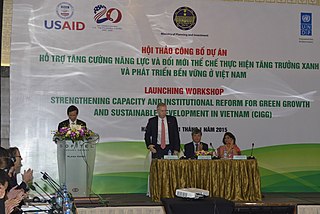
Capacity building is the improvement in an individual's or organization's facility "to produce, perform or deploy". The terms capacity building and capacity development have often been used interchangeably, although a publication by OECD-DAC stated in 2006 that capacity development was the preferable term. Since the 1950s, international organizations, governments, non-governmental organizations (NGOs) and communities use the concept of capacity building as part of "social and economic development" in national and subnational plans. The United Nations Development Programme defines itself by "capacity development" in the sense of "'how UNDP works" to fulfill its mission. The UN system applies it in almost every sector, including several of the Sustainable Development Goals to be achieved by 2030. For example, the Sustainable Development Goal 17 advocates for enhanced international support for capacity building in developing countries to support national plans to implement the 2030 Agenda.

The Department of Peace Operations (DPO) is a department of the United Nations charged with the planning, preparation, management, and direction of UN peacekeeping operations. Previously known as the Department of Peacekeeping Operations (DPKO), it was created in 1992 as part of a restructuring of the UN's peace and security apparatus. The DPO retains the core functions and responsibilities of its predecessor, with a greater emphasis on cohesion, integrating different resources and knowledge, and promoting human rights.
The United Nations Sustainable Development Group (UNSDG), previously the United Nations Development Group (UNDG), is a group of 36 United Nations funds, programmes, specialized agencies, departments and offices that play a role in development. It was created by the Secretary-General of the United Nations in order to improve the effectiveness of United Nations development activities at the country level.

Alan Claude Doss is a British international civil servant who has spent his entire professional life in the service of the United Nations, working on peacekeeping, development and humanitarian assignments in Africa, Asia and Europe as well as at United Nations Headquarters in New York City.

Kingsley Chiedu Moghalu OON is a Nigerian political economist and the President of the African School of Governance (ASG), a pan-African graduate school focused on public policy and governance based in Kigali, Rwanda. He served as Deputy Governor of the Central Bank of Nigeria, appointed by President Umaru Musa Yar'Adua, from 2009 to 2014. He subsequently taught at Tufts University as Professor of Practice in International Business and Public Policy at The Fletcher School of Law and Diplomacy from 2015 to 2017. He was the presidential candidate of the Young Progressive Party (YPP) in the country's general election in February 2019.
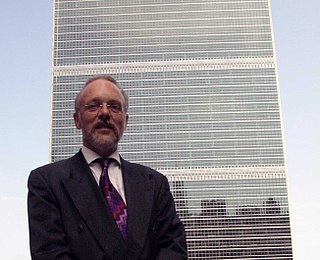
Franz Baumann is a German former United Nations official who, until the end of 2015, served as Assistant Secretary-General and United Nations Special Adviser on Environment and Peace Operations at the United Nations Secretariat in New York. From 2017 to 2021, he was a visiting research professor at New York University and is now an adjunct professor at Georgetown University in Washington D.C.
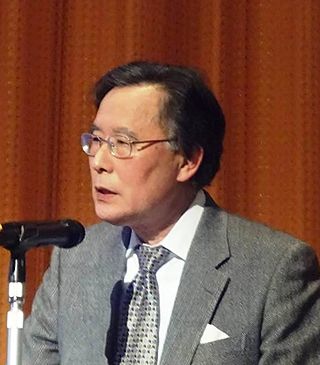
Sukehiro Hasegawa is a Japanese academic, educator, author and administrator. He served as the Special Representative of the Secretary-General of the United Nations for Timor-Leste and head of peacekeeping and peacebuilding missions, UNMISET, UNOTIL and UNMIT from May 2004 to September 2006. He is currently the President of the Global Peacebuidling Association of Japan, the ACUNS Liaison Officer in Tokyo, the Chair of the Hiroshima Peacebuilders Center (HPC) Council and the Personal Advisor to former president and Prime Minister José Ramos-Horta of Timor-Leste.
The International Institute of Rural Reconstruction, or IIRR, is an international non-governmental organization working in rural development. The mission of the organization is to "empower rural people to build resilient communities and attain socioeconomic equity through creative and community-led action."

Cities Alliance is a global partnership fighting urban poverty and supporting cities to deliver sustainable development. To manage its activities, the Cities Alliance operates a multi-donor fund with UN Office for Project Services (UNOPS), as host and trustee. Different members provide direction, financing and advocacy. Cities Alliance aims to deliver solutions to urban poverty.
Edouard Adrien André Wattez is a French United Nations diplomat who worked for the United Nations for more than 32 years in the Asia-Pacific, Africa and Middle East Regions in the United Nations Development Programme (UNDP) agency, leading assignments mainly in crisis, peace building, post-war and transition countries such as Senegal, the Fiji Islands, Rwanda, Jerusalem, Cambodia, Vietnam and Sri Lanka.
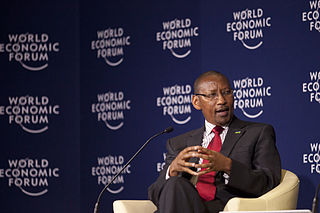
John Rwangombwa is a Rwandan accountant, politician and banker. He is the governor of the National Bank of Rwanda, the central bank and national banking regulator. He was appointed to that position on 25 February 2013.
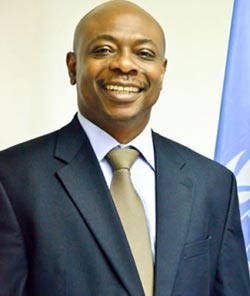
Alain Noudéhou is a Beninese diplomat who has been serving as Deputy Special Representative for the United Nations Multidimensional Integrated Stabilization Mission in Mali (MINUSMA) and Resident Coordinator in Mali since 2021, serving alongside Special Representative Mahamat Saleh Annadif. He was previously the Deputy Special Representative of the Secretary-General of the United Nations, Resident Coordinator, and Humanitarian Coordinator in South Sudan.
The United Nations Development Programme (UNDP) in South Africa is one of the 177 offices of the UNDP’s global networks located in the country's capital, Pretoria. As a part of the wider UNDP's development efforts, the local office is responsible for supporting the government to develop and implement policies to accelerate the attainment of the Sustainable Development Goals (SDG) in South Africa. UNDP interventions in South Africa focus on promoting actions that contribute to address the triple challenge of inequality, poverty and unemployment that the county faces. In that regard, the interventions include the promotion of youth employment; building resilience to climate change impacts; biodiversity conservation; water management; promotion of access to sustainable, clean and affordable energy; and promotion of citizens participation in democratic processes. Leaving no-one behind, gender mainstreaming and innovation are in the center of all UNDP cooperation.
Awa Ndiaye-Seck is a Senegalese national who serves as the United Nations Resident Representative in the Democratic Republic of Congo and Special Representative of the Executive Director on AWLN at UN Women. Awa has previously worked with the United Nations Development Programme (UNDP) and also served in the United States Agency for International Development (USAID) in various capacities.
References
- ↑ UNDP; foreword by Eimi Watana (28 Jun 2013). "UNDP CAPACITY ASSESSMENT AND DEVELOPMENT In a Systems and Strategic Management Context - Capacity assessment and development.pdf" (PDF). Management Development and Governance Division, Bureau for Development Policy, UNDP. Retrieved 5 Dec 2014.
{{cite web}}: CS1 maint: multiple names: authors list (link) - ↑ José Oscar Monteiro (11 Dec 2002). "Public Administration and Management Innovation in Developing Countries" (PDF). United Nations. Retrieved 5 Dec 2014.
- ↑ James Katorobo (8 Apr 2011). "allAfrica.com: Uganda: Performance Contracts Will Not Work in the Public Service". AllAfrica. Retrieved 5 Dec 2014.
- ↑ "For GMO Use in Eastern Africa, Regulation or Elimination? - Nourishing the Planet". WorldWatch Institute. 7 Dec 2010. Retrieved 5 Dec 2014.
- ↑ Boris Demodov (25 Jul 2005). "The Study of Best Practice in Civil Service Reforms by James Katorobo - Zunia.org". Zunia.org. Archived from the original on 2014-12-07. Retrieved 5 Dec 2014.
- ↑ United Nations (1 Apr 2010). Reconstructing Public Administration After Conflict: Challenges, Practices ... - Google Books. United Nations. ISBN 9789211231823 . Retrieved 5 Dec 2014.